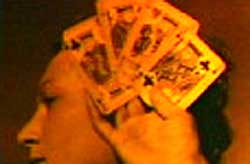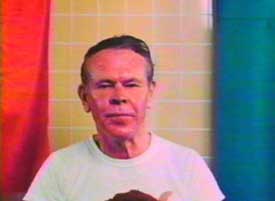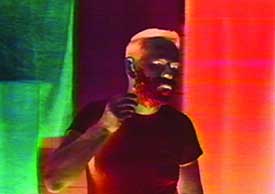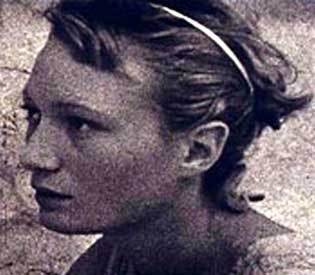The twelve minute black & white silent film La Cartomancienne; aka, Fortune Teller (1932) has some color tint moments. A musical score was added in 1972. Purportedly a "Jungian" film of alchemical intent (the director was very interested in Carl Jung), the symbolism is rather too elementary to matter: male & famale, land & water, is about it.
 It's an intriguing & surreal little fantasy even so. A beautiful young woman is taking down laundry from the line, on a hillside overlooking the sea, when she seems to hear whispering from a magic shell. She puts her laundry basket aside & hurries to investigate an ancient stone ruin, where she discovers the gypsy fortune-teller, with whom she sits to have a card reading. It's an intriguing & surreal little fantasy even so. A beautiful young woman is taking down laundry from the line, on a hillside overlooking the sea, when she seems to hear whispering from a magic shell. She puts her laundry basket aside & hurries to investigate an ancient stone ruin, where she discovers the gypsy fortune-teller, with whom she sits to have a card reading.
The reading is the usual stuff about meeting a tall handsome man. There follows a number of symbolist images of nature, possibly being the dreams of the young woman who is now sleeping amidst the ruins. In her dream she sees swimming beneath the waves a totally buff dude.
Our heroine awakens (or doesn't) & makes herself a wreath of flowers to wear for a wedding crown. She then inexplicably finds herself in the sea with her clothes still on hanging out with the nearly naked totally buff dude.
It's short enough to be fun rather than tedious, but seems to me you'd have to be an awfully twinky new age noodle to find anything deeply Jungian about such a simpleminded little narrative. It's more a straightforward paeon to masculinity, the ideal man as a body builder & the ideal woman as a laundress.
My gaydar raised unexpectedly as this film caused me to think Jerome Hill must've been a faggot & he gets to be the laundry maid. So I looked to see if he was listed among famous homosexual Americans & sure 'nuff.
Knowing this spazzy little sex fantasy was his personal fetish-fantasy rather than born of ignorant sexism made Cartomancienne a lot more forgiveable.
The feature-length Film Portrait (1972) is Jerome Hill's impressionistic autobiography, his last film & so we may imagine a final statement about himself. It opens with him shaving, but transformed into a rainbow colored man in negative. He eventually speaks, introducing himself in surrealist terms as the "me that am," or was, since every passing moment of "is" becomes within the second "was."
 He speaks of his art as that of a magician, providing wonderful color-drenched images of each flickering thought. With a clever editing trick Jerome is seen to be an alchemist sitting at a table editing film, speaking of the unedited film as the future, the edited film as the past, the syncronizer in the center the present. He speaks of his art as that of a magician, providing wonderful color-drenched images of each flickering thought. With a clever editing trick Jerome is seen to be an alchemist sitting at a table editing film, speaking of the unedited film as the future, the edited film as the past, the syncronizer in the center the present.
Throughout he speaks of time & self in the kind of philosphic terms that compel thirteen year olds of a particular brilliance, thoughts which are usually set aside as clumsy before one becomes a well-healed old filmmaker.
It seems as though the film is intentionally unrevealing as to personal life; it's as though he was, is, & always shall be no one but the ephemeral creature that worked on films & never had a life separate from them, which isn't true but is what he chose to convey.
And then as if he hadn't been obtuse enough, it turns into an abstract presentation of color, shape, & ghosts of people, clips from his old films, concluding with the observation "And the train still goes through the station." The train is not stopping, from which we can gain some meaning if symbolic meaning is really wanted.
Don Frederickson in his essay "Jerome Hill's Film Portrait: Individuation as Artistic Vocation" from the Milleniuim Film Journal (Fall, 2004) poses the question & expresses the opinion "Why did Hill hold back this film for almost forty years? I believe it is because this film for Hill carries an essential secret: he was homosexual. This does not appear to be a secret Hill hid from himself, but a personal truth he wisely chose not to broadcast in an explicit manner."
 I found no hint of his homosexuality conveyed by this decidedly un-autobiographic self-portrait, but Frederickson is certain it's the key to finding meaning in it, as he finds true also of The Fortune Teller which is scarsely an important film unless one realizes Hill is the washerwoman. I found no hint of his homosexuality conveyed by this decidedly un-autobiographic self-portrait, but Frederickson is certain it's the key to finding meaning in it, as he finds true also of The Fortune Teller which is scarsely an important film unless one realizes Hill is the washerwoman.
Film scholars finding these kinds of meanings is rather risky. I can believe Film Portrait fails to be consequential because Hill was reluctant to reveal the one critical thing about himself that would inform the rest. I can't see any clue in it that would explain why he was afraid to show the film for the many years this film remained tucked away.
I would hazard instead that there's a gentleness shared between The Fortune Teller early in his film career, & Film Portrait at the end, a gentle interest in supernatural alchemy that may or may not have explained to himself, though never fully in a public way, why he was who he was. If the films of Ken Anger can be seen as the Satanist rampaging ferociously despite the limp wrist, then Jerome Hill is his reverse, the kindly sorcerer for whom the magical arts are healing rather than sinister.
copyright © by Paghat the Ratgirl
|

 It's an intriguing & surreal little fantasy even so. A beautiful young woman is taking down laundry from the line, on a hillside overlooking the sea, when she seems to hear whispering from a magic shell. She puts her laundry basket aside & hurries to investigate an ancient stone ruin, where she discovers the gypsy fortune-teller, with whom she sits to have a card reading.
It's an intriguing & surreal little fantasy even so. A beautiful young woman is taking down laundry from the line, on a hillside overlooking the sea, when she seems to hear whispering from a magic shell. She puts her laundry basket aside & hurries to investigate an ancient stone ruin, where she discovers the gypsy fortune-teller, with whom she sits to have a card reading. He speaks of his art as that of a magician, providing wonderful color-drenched images of each flickering thought. With a clever editing trick Jerome is seen to be an alchemist sitting at a table editing film, speaking of the unedited film as the future, the edited film as the past, the syncronizer in the center the present.
He speaks of his art as that of a magician, providing wonderful color-drenched images of each flickering thought. With a clever editing trick Jerome is seen to be an alchemist sitting at a table editing film, speaking of the unedited film as the future, the edited film as the past, the syncronizer in the center the present. I found no hint of his homosexuality conveyed by this decidedly un-autobiographic self-portrait, but Frederickson is certain it's the key to finding meaning in it, as he finds true also of The Fortune Teller which is scarsely an important film unless one realizes Hill is the washerwoman.
I found no hint of his homosexuality conveyed by this decidedly un-autobiographic self-portrait, but Frederickson is certain it's the key to finding meaning in it, as he finds true also of The Fortune Teller which is scarsely an important film unless one realizes Hill is the washerwoman.